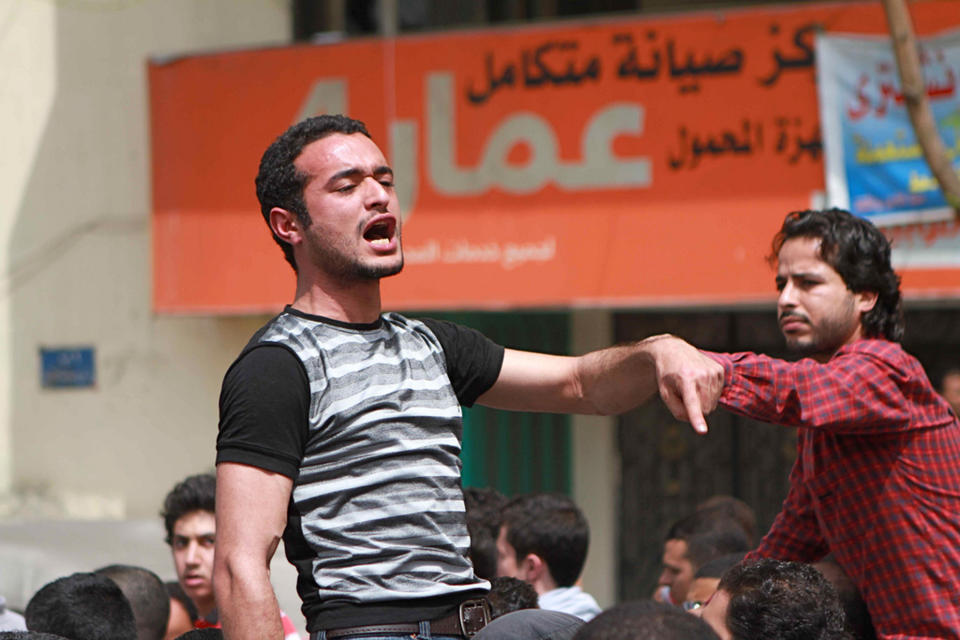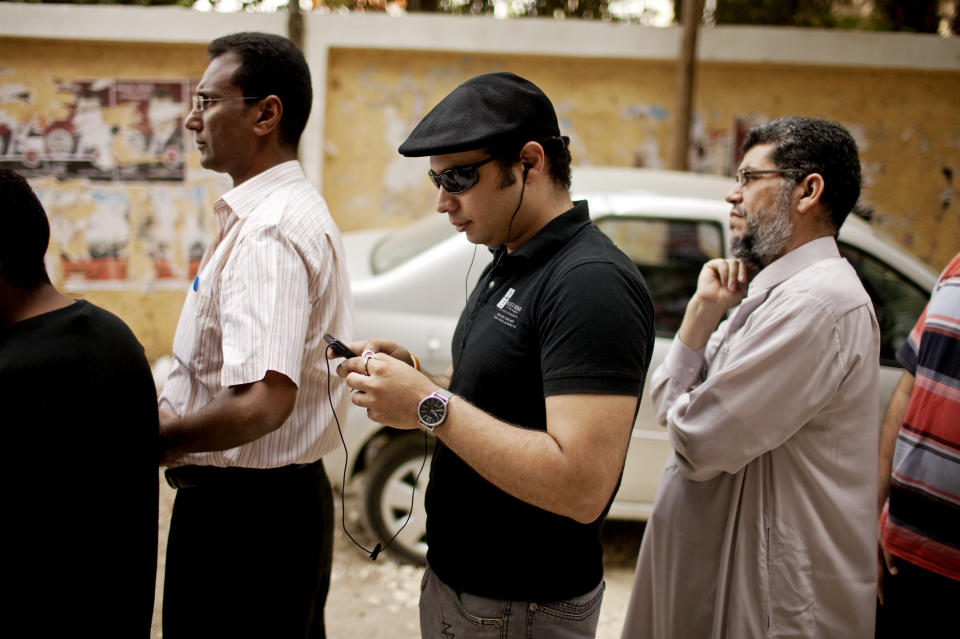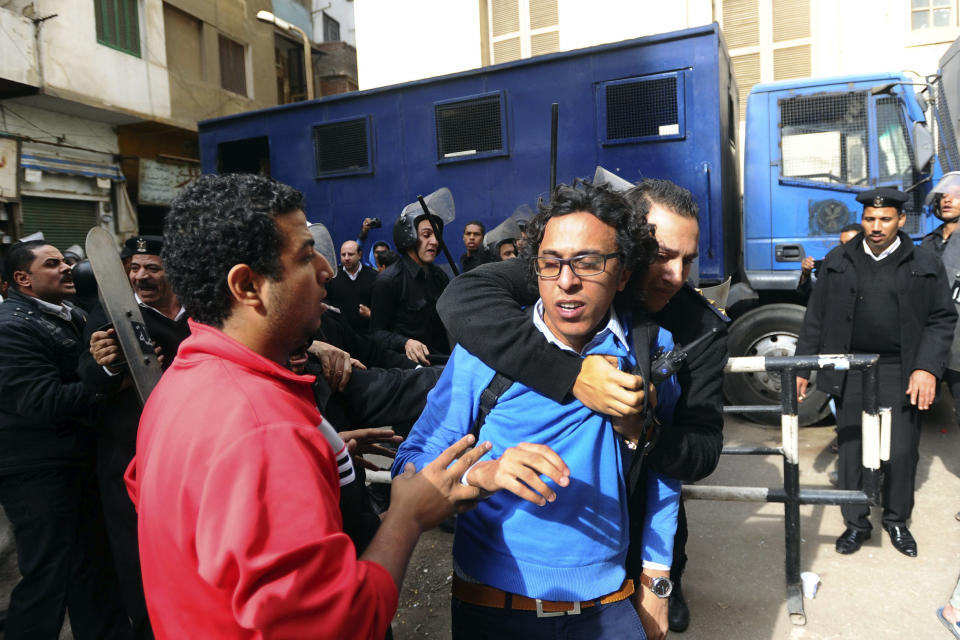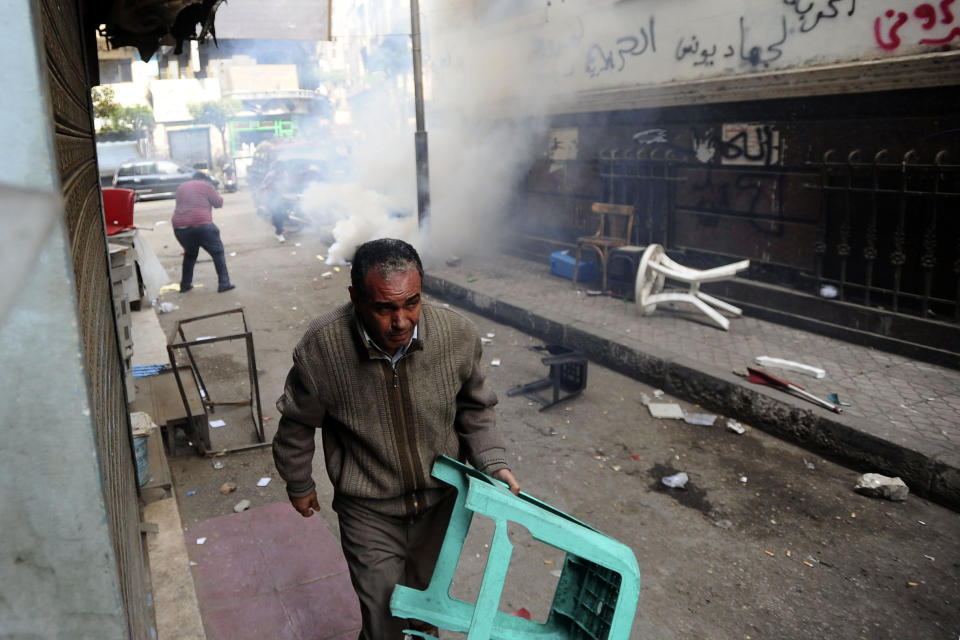Egypt court upholds sentence for 3 activists
CAIRO (AP) — An appeals court on Monday upheld the convictions and three-year prison sentences handed down to three of Egypt's most prominent political activists, a ruling that is likely to revive opposition to a draconian protest law they were accused of violating.
It is also certain to deepen the rift between the current military-backed government and Egypt's liberal and secular pro-democracy campaigners, many of whom participated in the 2011 popular uprising against Hosni Mubarak.
The ongoing campaign against dissent and pro-democracy activists has been overshadowed by a much larger crackdown against the Muslim Brotherhood group and other Islamists. That push has led to the death of hundreds and the jailing of at least 16,000 people since the July ouster of President Mohammed Morsi.
The three — Ahmed Maher, Mohammed Adel and Ahmed Douma — were charged with breaking a law issued last November that bans all political gatherings and protests held without prior permission from the police.
The verdict swiftly drew condemnation from international rights groups.
The ruling "tightens the vice on freedom of expression and assembly and is yet another sign of Egypt's growing climate of intolerance toward any legitimate criticism of the authorities," said Hassiba Hadj Sahraoui, deputy Middle East and North Africa director at Amnesty International.
She said the three never should have been put on trial and called for their release.
Sarah Leah Whitson, director of the Middle East and North Africa in the New York-based Human Rights Watch, said the verdict "is one more nail in the coffin for Egypt's revolution."
Senior leftist politician and presidential hopeful Hamdeen Sabahi called on interim President Adly Mansour, installed by the military in July, to pardon the three.
"It is unbecoming for Egypt ... to jail those among its youth who revolted because of an oppressive law," he wrote on his Twitter account.
The ruling sparked a storm of anger on social media networks. Dozens of activists called for a sit-in outside the presidential palace in the Cairo district of Heliopolis.
Douma's wife called for a protest in front of the presidential palace and on her Twitter account wrote: "if I get arrested, please be brave, come down, hold a protest for me and don't let me down as you did with Ahmed."
By late afternoon, dozens of women held a sit-in in front of the presidential palace, holding signs with pictures of the three activists calling for their freedom. They demanded abolishing the protest law under which the activists were arrested, charged and imprisoned.
"We began the sit-in ... girls and women demanding freedom for their brothers, sons and loved ones," wrote one activist, Mona Seif on her Twitter account.
Salama Said, one of the activists at the palace, said passers-by had insulted the group and security forces deployed to the area but force was used. It is still unclear whether they will hold an overnight sit-in or leave and return the next day.
The three young activists were among the founders of the April 6 movement. The group first gained nationwide attention when its activists openly challenged the Mubarak regime and its brutal police force with calls for a general strike in 2006. In the industrial city of Mahalla in the Nile Delta, a giant poster of Mubarak was ripped off and trampled on by protesters, a first at the time.
It was at the forefront of the 18-day uprising against Mubarak in 2011. It later joined the opposition against the generals who took over the reins of power for nearly 17 months after Mubarak's ouster. When the movement marked its sixth anniversary on Sunday, security forces sealed off Cairo's central Tahrir square, birthplace of the 2011 uprising, to prevent followers from celebrating there.
After Morsi's June 2012 election, April 6 initially supported him as the first democratically chosen president. But it soon became disillusioned with the Islamist leader's perceived attempts to concentrate power in his Muslim Brotherhood. April 6 supported Morsi's removal by the military last July, after days of protests by millions of Egyptians against his rule.
But again, April 6 shifted its stance to denounce what it describes as the curtailment of freedoms and the heavy handedness of the police under the current military-backed government.
The predominantly pro-military media has cast the April 6 movement as a treasonous organization with foreign links.
The three were accused of violating a controversial new law on holding street protests and were sentenced each to three years in prison in December. Maher was initially accused of taking part in an illegal protest in November.
He later surrendered to authorities, but clashes between his supporters and security forces outside the police station prompted prosecutors to amend the charges to assaulting police officers and organizing an illegal protest.
Douma and Adel were later added to the case.
Douma suffers from stomach ulcer and has complained in past court hearings that he was not being properly treated in jail. He appeared to have lost a great deal of weight when he appeared in court on April 1 for another trial.
The government depicts the protest law as aimed at bringing order to the streets in the face of months of continued demonstrations by Islamist supporters of Morsi. There has been no public sign of the law being applied to street gatherings by supporters of the military.
The court also ruled on Monday that each of the three would be fined 50,000 Egyptian pounds (about $7,140).
One of the defense lawyers, Gamal Eid called the verdict "oppressive" on his Twitter account just after the ruling was read.
In Washington, State Department spokeswoman Jen Psaki said the United States was "deeply troubled by the decision" against "three peaceful pro-democracy activists."
"We urge the Egyptian government to exercise its constitutional authority to commute these excessive sentences, which are not in line with the rights guaranteed in Egypt's new constitution, Egypt's international obligations or the government's own commitment not to return to Mubarak-era practices," she added.
Another defense lawyer, Ahmed Seif al-Islam, said he planned to appeal to a higher court, and if that fails turn to the African Court on Human and People's Rights.
Ragia Omran, a prominent rights lawyer, called for pressure on Mansour to rescind the law. The interim president currently holds legislative powers since parliament was dissolved.
"He can do this," she said. "This law has proven ridiculous, achieved nothing and will give rise to a new generation (of revolutionaries) that will come out to fight the regime."
___
Associated Press writer Sarah El Deeb contributed to this report from Cairo.





